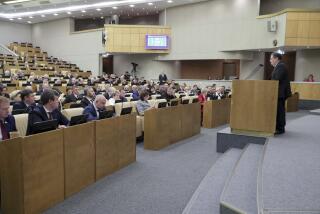Budget ‘Corrections’ Planned by Russia : Economic reforms: Leaders may have to add more than 10% to spending, leaving program unbalanced.
- Share via
MOSCOW — Yielding to pressure from a public hard hit by radical reforms, Russian officials indicated Wednesday that one of the keys to their economic program’s success--a balanced budget--may already have fallen by the wayside.
After declaring that a balanced budget was an indispensable component of their economic reform strategy, top Russian officials disclosed that the government has been forced to make “corrections,” which could add more than 10% to the spending plan.
The government 10 days ago introduced an austerity budget that all but balanced revenues with expenses. It was necessary, they insisted then, to bridle inflation, give value to the ruble and guarantee substantial foreign aid and debt deferrals that are conditioned on a no-deficit budget.
But Russian officials now say they need more money to increase pensions and to lower prices on staple goods, because their ambitious economic reforms have made life more difficult than they predicted. Since price controls and subsidies were lifted a month ago, prices have increased so much that 90% of those receiving pensions and 80% of all Russians live below the poverty line, Minister of Social Affairs Ella Panfilova told the legislature Wednesday.
The budget adjustments appear to add at least 40 billion to 45 billion rubles to the 420.5-billion-ruble first-quarter budget.
The government has agreed to lower the value-added tax on a number of staple goods, which will make them more affordable but which also will cause a “hole in the budget of about 25 billion to 30 billion rubles,” said Alexander N. Shokhin, a deputy prime minister and minister of labor and employment.
The government also pledged to increase pensions by about 200 rubles monthly per person, which will cost 15 billion more in February alone, he added.
The ruble at the new official rate of exchange is worth about 2 cents, putting the Russian government budget for the first quarter of the year at the equivalent of $8.4 billion and the additions at $900 million. At the market rate exchange, used for trade and by tourists, the ruble is worth less than 1 cent, and the budget would be equal to about $4 billion and the additions about $450 million. The ruble is not freely convertible to other currencies.
While disclosing the budget corrections, Shokhin and Andrei A. Nechayev, first deputy minister of economy and finance, did not say where the budget could be cut to make up for the additions.
Nechayev, however, explained that although deficit budgets are widely used around the world, they are unacceptable in Russia because the only way the country can cover a deficit would be to print more money. That, in turn, would cause hyper-inflation and derail the economic reforms. “We need a budget in the black because one of the requirements for getting assistance from the International Monetary Fund is to have a reduced budget deficit,” he said.
Shokhin said the government has not abandoned its original strategy. “The most important thing is not to let the correction of some details of the reform course develop into the changing of the course itself,” he said.
The economists also admitted that government revenues are not coming in as quickly as planned, which also spells trouble for the reforms. “One of our biggest problems is that, despite the high price increases, we cannot say that the government has received higher revenues, because the tax system is not yet developed,” Shokhin said.
Shokhin hinted at why the government was forced to compromise to ease hardships caused by the reforms, which sent prices skyrocketing a month ago. In the past, Shokhin and other officials emphasized that their policies were influenced only by economic considerations. But now, he says, public opinion is starting to affect them as they try to rally popular support for their reforms.
More to Read
Sign up for Essential California
The most important California stories and recommendations in your inbox every morning.
You may occasionally receive promotional content from the Los Angeles Times.













